Project “Enhancing capacity of universities to initiate and to participate in clusters development on innovation and sustainability principles” (UniClaD)
EU program Erasmus +, project KA2 n° 609944-EPP-1-2019-1-LT-EPPKA2-CBHE-JP
Study tour Austria 27.3.-31.3. 2023
UCAEP/BAB
Within the framework of the Erasmus+ project UniClaD ("Enhancing capacity of universities to initiate and to participate in clusters development on innovation and sustainability principles ") a series of study tours to EU countries are carried out with the aim to support the consortium partners in the development of Agrofood clusters in Moldova, Ukraine and Azerbaijan.
From March 27 to 31, 2023, a study tour was conducted in Austria, organized by the Federal Institute of Agricultural Economics Rural and Mountain Research (BAB) and the University College of Agricultural and Environmental Pedagogy (UCAEP).
The Austrian Study Tour comprises instructions and field visits on Austrian Clusters of Green Care, Nature Education, Farm Holidays, Eco-Pedagogy, Food Clusters and Food- and Agrotechnology. Besides this the participants will learn about the tasks and activities of the hosting institutions Federal Institute for Agriculture Economics, Rural and Mountain Research (BAB) and University College for Agrarian and Environmental Pedagogy (UCAEP).

Day 1 University College for Agrarian and Environmental Pedagogy (UCAEP) and Green Care. Presentation of UCAEP and its activities
The University College for Agrarian and Environmental Pedagogy Vienna is a science and pedagogic center for the education of teachers and consultants in the professional fields of agriculture and forestry as well as environmental education
UCAEP stands for educational programmes of excellent quality and innovation. Since 2006 the theoretical framework of Green Care and Social Farming has been developed.
Studies in Agrarian Pedagogy: In this training, students acquire the necessary qualifications to teach pupils of Schools of Agricultural and Forestry Sciences as well as adults in Further Education. Therefore, promoting the students’ ability to convey their expertise successfully has become the central aim of UCAEPs teacher training program. The focus lies on subject areas such as business management, agricultural sciences, food sciences, regionalmanagement, educational sciences, personality development and project management. Studies in Environmental Education: In the study program of Environmental Education, great importance is attached to the qualification of students in the areas of environment, sustainable development and pedagogy. The program involves issues such as a sustainable development in local and regional areas, climate protection, energy efficiency, educational sciences, personal development and project management.
Besides the bachelor- and master Studies many further education studies are offered. (e.g. Masterprogramm Green Care, horicultural therapy, Animal Assisted Therapy). Source: https://www.haup.ac. at/en/


Presentation Green Care Austria
The term Green Care summarizes all activities with physical, psychic, pedagogic or social care and support measures by using nature, animals or plants. Well-known examples are animal-assisted therapy (with small animals, farm animals or riding animals), care farming and horticultural therapy. Green Care means “green treatment”. It is a general term for all those initiatives and activities in science and practice, which attempt to make physical, psychic, pedagogic or social improvements with the help of nature, animals or plants, for specific target groups, by using living parts of nature - like animals or plants – or non-living parts of nature – like stones or water. These positive supporting aspects shall preserve or enhance health, welfare and quality of life of people.
Source: https://www.greencare.at/ https://www.greencare-oe.at/
The participants of the visit got acquainted with the Education Programs Green Care at the University College:
• Certificate Course Horticultural Therapy (60 ECTS, part-time)
• Master programme Green Care – (120 ECTS, part-time, Master of Science)
• Certificate Course Animal Assisted Therapy (60 ECTS, part-time)
• Certificate Course Equine assisted therapy (60 ECTS, part-time)
Source: https://www.haup.ac.at/weiterbildung/lehrgaenge/
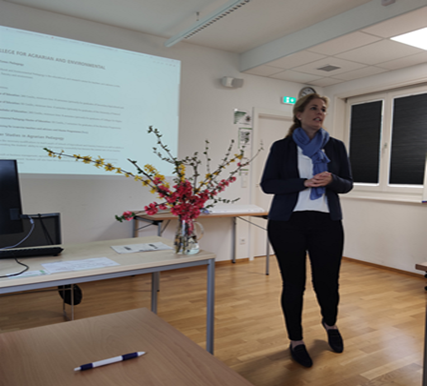

Field trip: Horticultural Therapy, Hospital Hietzing
It has long been known that spending time in nature is good for your health.
Increasingly, this insight is now also being adopted in everyday life in hospitals. Especially elderly people and people with cognitive impairments need stimulation and variety. The Hietzing Hospital is taking this new approach and offers its patients the opportunity to recharge their batteries in the specially therapy garden specially set up for this purpose. Dr Fritz Neuhauser presented the activities
Source: https://klinik-hietzing.gesundheitsverbund.at
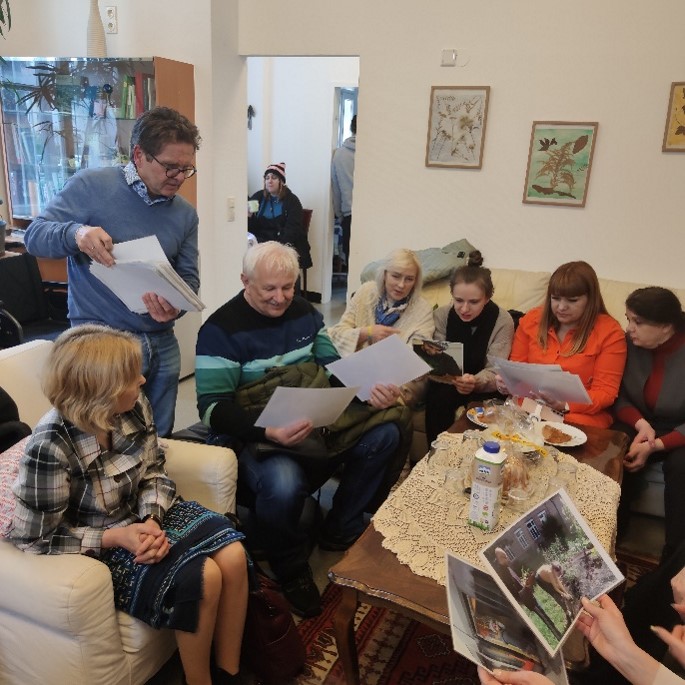
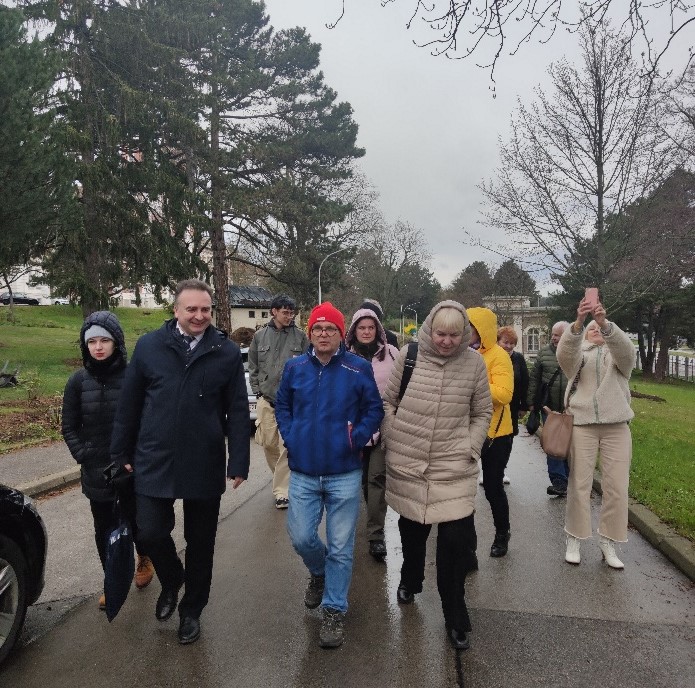
Day 2 – Holidays on the Farm and Eco Pedagogy Cluster presentation Holidays on the Farm Burgenland
Vision for Holidays on the Farm (Urlaub am Bauernhof) 2020: Holidays on the Farm cluster member farms are vacation farms, where hosts and guests are familiar with the values of the rural world (everyday life, nature, food production, tradition and handicraft) consciously, sustainable and respectful. Holidays on the Farm stands for values that make the offer unique and attractive for the guests: for experiencing the rural world, all steps of food production, for sustainability, for happy vacations in the countryside, for family hospitality and fairness. Holidays on the Farm becomes the preferred brand for all those who are interested in the life of the farming community, in nature and sustainable ways of living, in the associated form of vacation and for all those who would like to achieve added value and other benefits from it. (Urlaub am Bauernhof, Cluster-Bericht 2019)
Sources:
Urlaub am Bauernhof, Cluster-Bericht 2019
https://www.farmholidays.com/en/burgenland
Farm holiday enterprise: Weingut Pension Kranixfeld-Fischl
Weingut Pension Kranixfeld-Fischl is a family farm in Mörbisch, Burgenland, formed by three generations. They offer a bed and breakfast with 10 rooms, awarded with 3 stars and 4 flowers (quality criteria Holidays on the Farm Austria). The Weingut (= wine estate) is well established and several wines were winning awards.
Mörbisch is situated on Lake Neusiedl in Burgenland at 118 m above sea level. With well over 100,000 overnight stays per year, Mörbisch is one of the largest tourist communities in Burgenland. The Mörbisch Lake Festival impresses thousands of guests every summer against the natural backdrop of Lake Neusiedl. In addition several options for recreation (hiking, cycling, sailing, surfing…) care attractiveness for tourists and chances for a successful combination of agriculture and tourism are quite high.
Sources:
https://www.kranixfeld-fischl.at/pages/home/startseite.php https://www.urlaubambauernhof.at/de/hoefe/kranixfeld-fischl
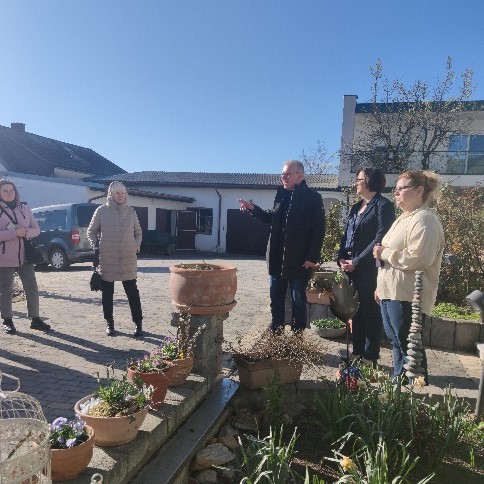


Farm enterprise: PANNATURA GmbH
PANNATURA GmbH (= limited liability company) is a company of the Esterhazy Group, whose acitivities comprise forestry and agriculture including nature conservation, viticulture, real estate management and development, tourism and culture. Forestry, agriculture and nature conservation are summarized under the umbrella brand Pannatura.
The large-scale agricultural activities focus on organic farming in a sustainable way. In all branches (arable farming, viticulture, animal husbandry, food processing) the diversity of activities, regional circular approaches and a well adapted chain of activities are followed.
Beside that forest pedagogy is one of the services provided by PANNATURA. Certified forest educators bring children closer to the forest as a habitat with its individuals by imparting specialized knowledge and learning through play. Through listening, feeling and touching, the closeness to nature becomes tangible and a relationship to the forest is created. In addition themed tours (e.g. Timber harvesting: How does the tree get from the forest to the sawmill" or "Forest as a habitat for animals") are offered. All forest excursions are supervised exclusively by Esterhazy forestry staff, who, as trained foresters, have the best know-how and, as certified forest educators.
Sources:
https://pannatura.at/
https://pannatura.at/dienstleistung-handel/waldpaedagogik/ https://www.flipgorilla.com/p/25693471184530298/show#/25693471184530298/64 https://esterhazy.at/



Eco-pedagogic enterprise: animal-assisted intervention St. Martins
St. Martins is a certified farm for animal-assisted intervention. "Animal-assisted intervention" describes the conscious and targeted use of animals in education and/or therapy. For this, training had to be completed by both humans and animals. The animal-assisted professionals, the animals, the stables and the safety on the farm are closely examined. The St. Martins TGI team deals with the animals of the St. Martins Stables on a daily basis. Accordingly, the baroque donkeys, goats, sheep, chickens & co. are extremely motivated and very happy - under expert supervision - to be active together with people.
According to the definition of "biophilia", the enterprise wants to enable the guest to meet the animal - or nature in general - at eye level and thus experience well-being & stress reduction. After all, humans need the living environment in order to remain psychologically and physically healthy. The effects of the intervention comprise i.a. increased physical well-being (e.g. lowering blood pressure), stress reduction & relaxation, promotion of positive self-image, experience of relationship & connectedness, promotion of communication, increased stamina & concentration, reduction of anxiety, increased emotional wellbeing, experience joy and fun.
Sources: https://www.stmartins.at/de/safari-tiergestuetzte-Intervention-coaching-mit-tieren-inoesterreich.html https://www.greencare-oe.at/auszeithof+2500++1000174+1053


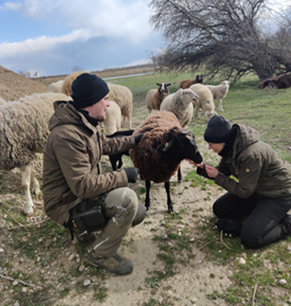
Day 3 – Nature Education, Nature Park
Presentation of the Nature Education Platform
Nature educators are Austria's flagship in the implementation of offers for people with an affinity to nature. They are characterised by profound expert knowledge about the local fauna and flora and establish a connection to the use of nature and landscape and the production of local food.
Plattform Naturvermittlung is a network of organisations and individuals active in the field of nature education in Austria. The Plattform combines the knowledge, experience, creativity and strengths of its members and uses them for quality assurance and further development.
Source:
https://www.plattform-naturvermittlung.at/
Nature education activities in Nature Park Purkersdorf
The Purkersdorf - Sandsteinwienerwald Nature Park is located in a nature and landscape conservation area on the western border of Vienna.
The nature park offers attractive and well-maintained recreational facilities that are in keeping with the character of the landscape. This enables the approximately 35,000 visitors per year to actively experience nature with a variety of offers in the spirit of the nature park philosophy, as well as to find peace and relaxation with all their senses in the midst of the nature park. The nature park team is particularly concerned with children, school classes and groups of all ages as part of its educational mission to raise awareness of biodiversity and nature conservation. Every year, about 70 groups are accompanied by trained forest and nature educators on their forest excursions. In the park's own nature park centre with wood laboratory and self-service museum, guests learn more about the life of Vienna Woods farmers 100 years ago and the saviour of the Vienna Woods, Josef Schöffel.
Source:
Homepage: https://www.naturpark-purkersdorf.at/en



Day 4 – Food Clusters and Food- and Agrotechnology
Technopol Wieselburg
When research institutes, educational institutions and business enterprises create a unit at a site in order to do internationally recognized, cutting-edge research and to establish business trends, this is considered to be a Technopol with pioneering standards. Technopols are platforms for know-how transfer and knowledge dissemination and promote regional and international cooperation. The Technopol program is co-financed by the European Regional Development Fund (ERDF).
Thanks to these synergistic effects, a strong potential for regional and international cooperation and robust networks are created. The goal is to position Lower Austria as a high-tech centre in Europe and to extend the regional value-added chain. That concept has proven success. The multidisciplinary collaboration has put Technopol facilities among the top-ranking research and development worldwide.
As an international centre for bioenergy systems, food and agricultural technology, Wieselburg is the youngest Technopol location in Lower Austria. A guarantor of success for top international research and effective economic impulses: Co-operation between research, industry and education at the Wieselburg location has so far resulted in top performance and efficient solutions. An efficient structure for solving problems and developing innovative products is available for cooperation partners.
Sources: https://www.ecoplus.at/interested-in/clusters-technopols/technopols-in-lower-austria/ https://www.ecoplus.at/interessiert-an/technopole/technopol-wieselburg/


Food Cluster Lower Austria
The food industry is an essential economic factor in Lower Austria and encompasses a broad spectrum of activities. These range from agricultural production to the distribution of food and beverages. Since 2000, a network, which covers the entire supply chain in the food industry, was established in Lower Austria. This regional network of companies in the food industry, which works closely with suppliers, universities, research institutes, educational and public institutions, forms the basis for a national competitive edge. The Food Cluster has meanwhile established itself as a cross-sector interface, contact and contact hub for the food industry. The approximately 250 cluster partners reflect the multi-faceted picture of the industry. The Food Cluster focuses on all areas of the value chain.
Sources: https://www.ecoplus.at/interested-in/clusters-technopols/clusters-platforms-in-loweraustria/food-cluster-of-lower-austria/
Innovation Farm
The Innovation Farm deals with new technologies, trends and developments and makes them visible, tangible and above all applicable for agriculture. It currently consists of three locations (Innovation Farm Wieselburg, Innovation Farm Raumberg-Grumpenstein, Innovation Farm Mold) and 20 pilot and demo farms throughout Austria.
The Innovation Farm consortium bundles competences in the field of digitalization in order to promote an environmentally friendly development of agriculture with the help of new technologies. Practical testing, optimization and communication of modern, technical developments, products and concepts in the internal economy (animal husbandry) as well as the external economy (arable farming, grassland) are the main tasks. The objective of the Innovation Farm it to highlight the benefits of new technical solutions for Austrian agriculture and facilitate the access to new developments for farmers, thereby making an important contribution to sustainable agriculture. Through the interaction of manufacturers and research, practical solutions for modern farming operations are to be evaluated and also made available. The term Agriculture 4.0 is made tangible and applicable for users. In doing so, opportunities as well as risks are to be highlighted, trends are analyzed and efficient and sustainable farming is ensured with the available know-how.
Source: https://www.innovationfarm.at/

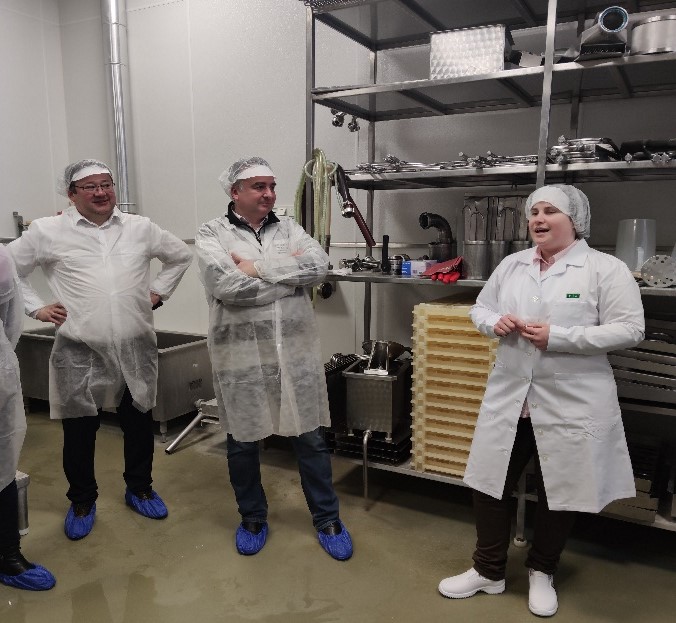
Foodtechnology Centre HBLFA Francisco Josephinum
The Centre has a long history: founded in the post-war period to solve the problems of the emerging dairy industry; operating for a long time as a federal agency; then in 2022 spun off into the Austrian Agency for Health and Food Safety GmbH (AGES) and thus privatized. Continuation of the former Technology Department as the Foodtechnology Centre by the Francisco-Josephinum Teaching and Research Centre. The competencies of the Foodtechnology Centre include testing activities, personnel qualifications for the food industry, food additives, food and biotechnology, and food sensor technology. The portfolio for research and development projects includes technical and equipment resources in the areas of milk and milk alternatives, beverages, desserts and ice cream, delicatessen, biotechnology, fruit processing and other technologies (e.g. freeze-drying, evaporation).
Source:
https://www.josephinum.at/forschung-und-pruefung/lmtz/das-lmtz.html
Rosenau Feed Laboratory
The Rosenau Feed Laboratory is a service facility of the Chamber of Agriculture Lower Austria located in the Technology and Research Centre Gewerbepark Haag 3, 3250 Wieselburg-Land. This laboratory was founded in 1978 with the aim of offering livestock farmers cost-effective and rapid feed analyses for animal- and performance-oriented feeding, as well as economical and environmentally friendly livestock management. The scope of analysis includes chemical, microbiological and mycotoxicological tests of basic and concentrated feeds for livestock and pets.
Source:
https://www.futtermittellabor.at/



Day 5 – Federal Institute of Agricultural Economics, Rural and Mountain Research (BAB)
Presentation on Federal Institute of Agricultural Economics, Rural and Mountain research
(BAB)
BAB, represented by its director Thomas Resl, is a socio-economic research institute for agricultural policy, the food industry, farming and rural areas, particularly including mountain regions affiliated to the Federal Ministry of Agriculture, Forestry, Regions and Water Management (BML). The Institute analyses interactions between agriculture and society from different perspectives and draws up basic principles and approaches for the sustainable development of rural areas in a national and European context. A differentiated view of agricultural enterprises, structures and systems as well as a spatially differentiated analysis, with a special focus on the development of mountain areas, are in the focus. The conception, structuring and evaluation of data on agriculture and rural areas in an extensive data pool forms an important basis for scientific analyses, studies which serve for agricultural policy decisions. Systematic documentation of important specialist literature is also carried out in the Institute's own special library, which is a scientific resource for internal and external users.
Source:
www.bab.gv.at
Internet Standard Gross Margins Application
The IDB application ("Interaktive Deckungsbeiträge", idb.agrarforschung.at), offers a comprehensive collection of data and detailed yield calculations for a wide range of agricultural production methods, including conventional and organic cash crops, forage production and animal husbandry. As far as possible and useful, the production methods are differentiated according to production conditions (e.g. slope, dry/wetland) and management decisions (e.g. turning or conservation tillage, crop intensity). It is used by farmers and famer’s advisory services for a variety of purposes, like data basis for analyses at sector level, point of reference for analyses at farm or process level when farm-specific data is lacking, calculation tool for farm-specific analyses by overwriting default values with farm-specific values.
This research is funded by the Federal State of Austria, the provinces of Austria and the European Union (EIP-AGRI).
Source:
https://idb.agrarforschung.at/verfahren/konventionell


Study Tour Workshop on Lessons Learned
The study tour was based on the methodology of action learning, which means open ended learning based on observation, dialogue, reflection, participation and visioning. It included field visits, classroom work and a post-study reporting period.
The classroom work was organised as a workshop consisting of two elements: A group work within the participating organisations, where the attendees discussed the different items of the study tour and then reflected on two questions: Q1. What were the most important experiences during the study tour? Q2. What can be transferred to Ukraine respectively the own institutions? Subsequently the results of the group work were presented and discussed in plenary. A list of key success factors was derived from the results.


